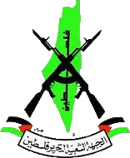The Popular Front for the Liberation of Palestine – General Command (PFLP-GC) was established in April 1968 by Ahmed Jibril, a former captain in the Syrian Army, mostly around a nucleus of former Syrian army officers. They joined the PFLP, but split from it after an internal struggle with George Habash and other PFLP leaders with the intention of focusing more on fighting and less on politics Since its inception the PFLP-GC has advocated armed insurrection. Although the organization has no particular ideology, it has certain Marxist characteristics. In April 1977, the organization split when a pro-Iraqi faction left because of the PFLP-GC's pro-Syrian orientation. In June 1974, the PFLP-GC joined the PLO although it opposed the latter's political initiatives. In 1983, however, encouraged by Syria, it joined the organizations contesting Arafat and Fatah; therefore its membership in the PLO was suspended in 1984. The PFLP-CG, under Syrian influence, opposed the Oslo accords and advocated the continuation of the armed insurrection during the 1990s. Because their opposition is similar to that of Hamas, the two organizations were drawn to one another and today often coordinate their positions. The organization's operational-terrorist infrastructure and bases are located mainly in Syria and Lebanon (including Ein Saheb, which was attacked on October 5, 2003). Headquartered in Damascus, the PFLP-CG receives logistic and military support from Syria and financial support from Iran. The organization carried out dozens of attacks in Europe and the Middle East during the 1970s and 1980s and is known for cross-border terrorist attacks into Israel using unusual means, such as hot air balloons and motorized hang gliders. The group's primary focus now is on guerrilla operations in southern Lebanon. Its attacks usually come from over the Lebanese border and its presence in the PA-administered territories is minimal. Its attacks against Israel include:
Jabril’s son, Jihad, was killed by a car bomb in May 2002. Sources: Intelligence and Terrorism Information Center at the Center for Special Studies (C.S.S); Patterns of Global Terrorism 2003, U.S. State Department |
